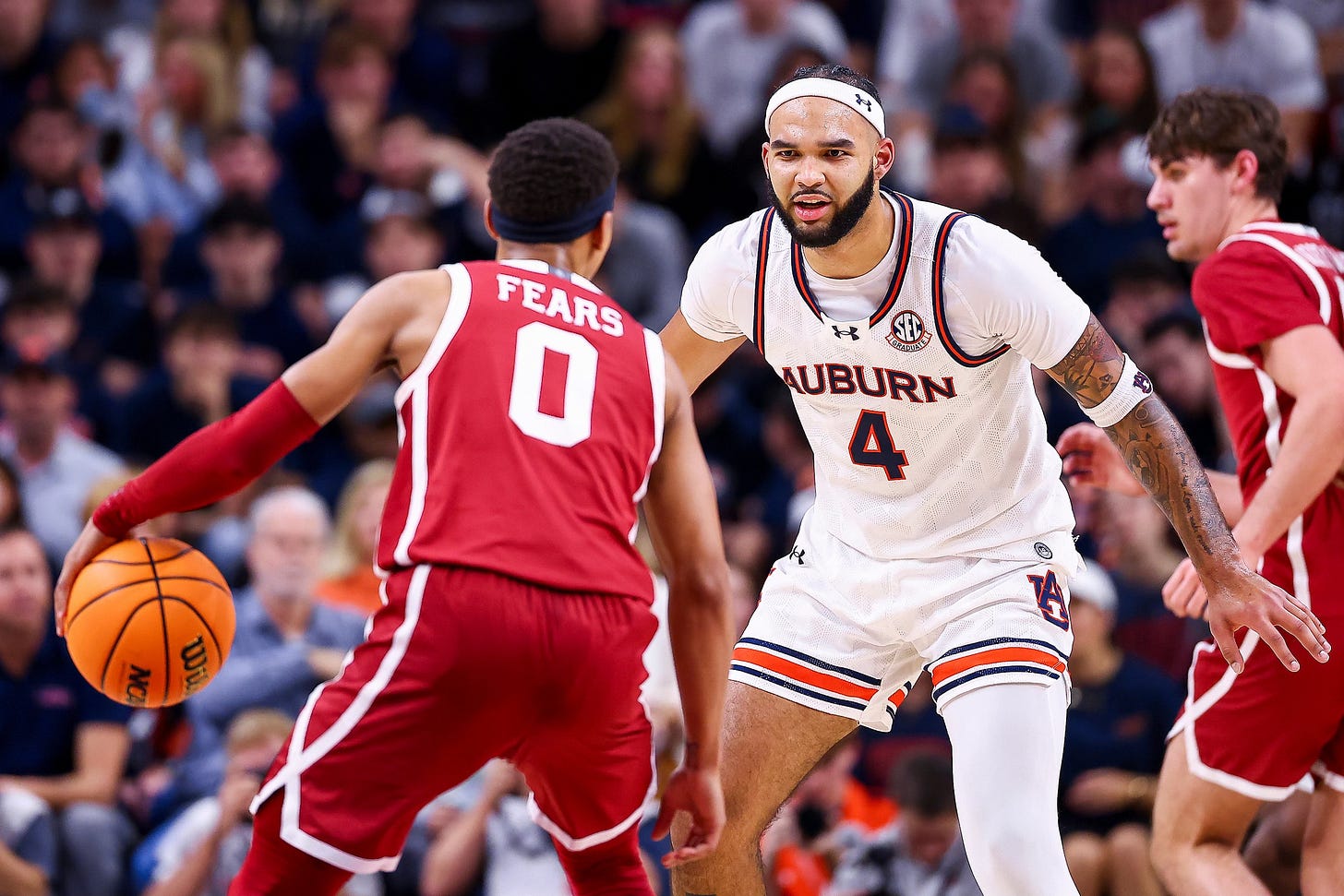Mailbag 198: Just how old is this Auburn team, really?
This week: Broome vs. Flagg, Dylan Cardwell's value, midseason All-SEC, Miles Kelly's improvement, Kenny Gabriel, Red Dead and laundry
(Zach Bland/Auburn Tigers)
Is Auburn the oldest team in the SEC? How many players are 23 or older?
Mark
AUBURN — Let’s jump straight into the questions for this week’s mailbag, because there’s a perfect connection between the first and second one.
Bruce Pearl went all-in on experience this season. This was the last run of the COVID waivers, meaning that Auburn had several fifth-year seniors it could bring back in the form of Johni Broome, Chad Baker-Mazara, Dylan Cardwell, Chaney Johnson and Chris Moore. He also went into the transfer portal to pick up a trio of fourth-year seniors in Miles Kelly, Ja’Heim “Turtle” Hudson and JP Pegues, joining another fourth-year senior in Denver Jones.
Freshmen Tahaad Pettiford and Jahki Howard were going to be the only non-seniors in the rotation. That is an incredible amount of age. Baker-Mazara just turned 25. Jones is 24. Cardwell, Moore and Hudson are all 23.
According to KenPom, Auburn ranks No. 26 nationally in average number of full Division 1 seasons played by the current roster, weighted by minutes played.
Yet that number only ranks seventh in the SEC.
The best conference in the history of modern college basketball, unsurprisingly, is filled with teams that are loaded with experience. The average Ole Miss and Kentucky player this season has already spent three seasons in Division I basketball. They rank No. 3 and No. 4 nationally. Texas A&M, Alabama and Tennessee are No. 13, 14 and 15. Texas is at No. 20.
A lot has been made of Auburn beating a lot of ranked teams already this season. Well, how about the fact that it’s beaten the No. 3, No. 6 (Memphis), No. 15, No. 20 and No. 22 (Iowa State) most-experienced teams in the country?
Of course, there’s a couple of caveats to Auburn’s experience situation. First of all, Baker-Mazara spent a season in junior college before coming to Auburn. That affects his Division I experience. Jones also played in junior college. Because of that, Baker-Mazara and Jones somehow have a chance to play again next season for the Tigers.
But several other SEC teams have more Division I experience — and a chunk of the veteran transfers played high-major basketball before their current stops. That’s not the case with Auburn, as Kelly is the lone import who spent time at a power conference. The rest played at Morehead State, Duquesne, San Diego State, FIU, pre-ACC SMU, Georgia State, Furman and Division II Alabama-Huntsville.
As Jerry Hinnen wrote in his excellent guest column yesterday, one of the most remarkable aspects of this juggernaut Auburn team is the fact that it’s not loaded with traditional high-level talent. Pettiford and Howard are the obvious exceptions. This is a team of players who have proven their entire careers that they believe in work, hard work.
And that shows on the floor. This is a battle-tested team that leads major college basketball in opponent assist rate and (deep breath) ranks inside the top 10 nationally in turnover percentage and defensive effective field goal percentage, inside the top 20 in offensive effective field goal percentage, inside the top 25 in offensive rebounding percentage and block percentage, and inside the top 30 in opponent 3-point percentage and 3-point attempt rate. That’s hard-nosed, veteran basketball.
On top of that, this Auburn team is going to enter the weekend as the only team in the country that hasn’t taken a second loss yet. It’s played the single-toughest schedule in college basketball to date and is on pace to shatter records for Quad 1 victories. That doesn’t happen without an incredible level of maturity and poise. The Tigers take all of their opponents seriously, absorb scouting reports as well as anyone and deliver in close games.
That’s what a veteran-led basketball team does when it’s firing on all cylinders.
There's a lot of talk about Flagg and Broome being front runners for POTY, and it seems the national outlets are a little biased towards Flagg. (Probably the homer in me.)
Could you break down the season stats between them and compare production/efficiency/vs defenses/offenses played by the minute rather than games?
I feel like Broome does more with less, compared to Flagg, and has 2 games of limited time that count against him.
Anthony
Keep reading with a 7-day free trial
Subscribe to The Auburn Observer to keep reading this post and get 7 days of free access to the full post archives.


